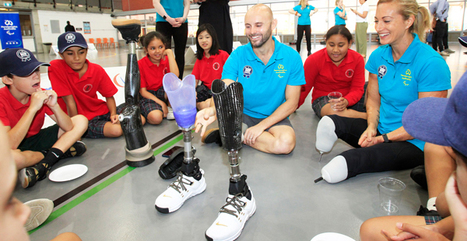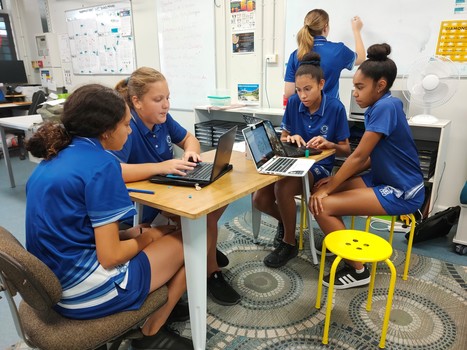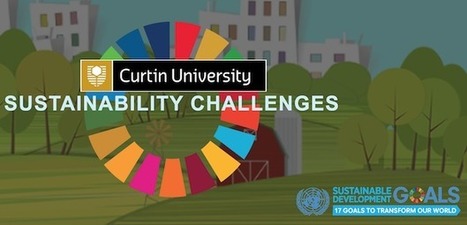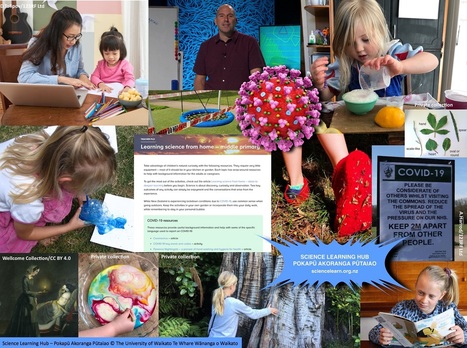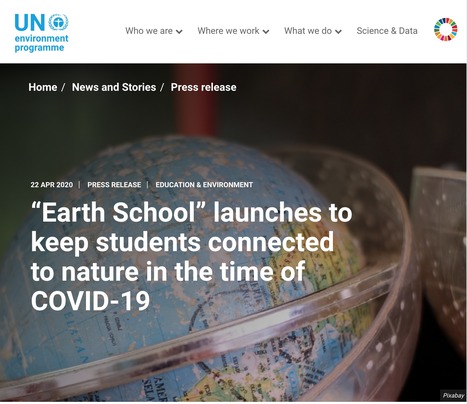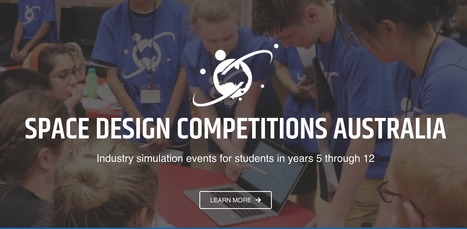Get Started for FREE
Sign up with Facebook Sign up with X
I don't have a Facebook or a X account


 Your new post is loading... Your new post is loading...
Current selected tag: 'collaborative'. Clear
Kim Flintoff's insight:
"Bebras Mini Challenges Bebras Mini Challenges are shorter versions of the Bebras Challenge with a focus on a particular Computational Thinking skill. Bebras Mini Challenges, like Bebras 365, are available as a free, easy-access resource throughout the year. Bebras Mini Challenges and do not require a student or teacher login to access and students will receive a grade upon completion of the questions. These challenges are shorter than Bebras 365 with a focus on one particular Computational Thinking skill. Bebras Mini Challenges have been divided into three categories: primary school students, middle school students and senior secondary students.The primary category is recommended for students in years 3-5, middle school for students in years 6-8, and senior secondary for students in year 9 and above. These age groupings are a suggestion only, and we encourage students to challenge themselves by attempting different question sets."
FACULTY OF HUMANITIES Flexible Learning Getting started with Flexible Learning and Blackboard
Kim Flintoff's insight:
This was put together back in 2012 - assuming it was totally redundant by now, it was left to languish in a repository at Slideshare... but it might hold some interest:
Despite the mention of humanities it reflects a wholistic approach to planning, creating, delivering and assessing in a flexible manner in any discipline. It reflects its original context but carries all the thinking behind flexible learning engagement in broad terms.
Classrooms around the world are now using Inanimate Alice as an across-the-curriculum approach to teaching and learning. First meet Alice age 8, drawing a stickman and taking photos to send to her Dad. Grow up beside her through school and college during which time she hones her artistic and technological skills, relentlessly pursuing her dream. Classrooms around the world are now using Inanimate Alice as an across-the-curriculum approach to teaching and learning. This is a story for teachers and students who wish to explore the nature of ‘born digital’ narratives. Free from the constraints of print formats, the text becomes dynamic, driving the story forwards, and the ambient sounds complement the immersive nature of the story. The format targets students 10-14 years of age: colourful magazine pages attract younger students, while the later episodes explore more complex themes. Resources and activities help teachers integrate Inanimate Alice into the curriculum. This is a story of exploration. An adventure. Take a look at the timeline of Alice’s adventures and find the best place to start for you.
Kim Flintoff's insight:
Inanimate Alice will be well-known to many Australian educators - Education Services Australia was a longtime champion of this platform and there are many teaching resources available to support its use.
Inanimate Alice is a member of the Learning Futures Network.
The Game Changer Awards is an opportunity for teachers and their students who are interested in STEM, to create solutions to the worlds challenges, and compete at a state level for amazing prizes. There are four age categories for Year 3 and 4, 5 and 6, 7 and 8, and 9 and 10 students. In each age group, there are then prizes for students and their teachers for Best use of STEM, Best overall Project and Best Presentation. Students work on their projects throughout the year, with the support of their Teachers, and come together on Game Day, to present them to the judges. The teams are also given the opportunity to showcase their projects to the families and other teachers, as well as industry and government representatives. In the tradition of science fairs, we encourage students to unleash their inner innovator to create projects aimed at developing and utilising STEM skills, including project based learning, organisation, teamwork and presentation skills. We currently have 78 teams registered to take part in 2019, and we plan to expand even further in 2020, to take the awards to all parts on WA.
Kim Flintoff's insight:
While working online to teach and learn it is also important to remember that we still need to come together to acknowledge and celebrate the learning.
You can enrol as many students from your school as you wish. All students will need to pair up with a classmate or someone they know at school or in their community, so they can work side-by-side. Each pair will then meet and join up with a pair of students from anywhere else in the world. Ideally all teams should have 4 students. Teams can have as many advisors and helpers as they wish, but only four students will be the officially recognised team.
Kim Flintoff's insight:
You can enrol as many students from your school as you wish. All students will need to pair up with a classmate or someone they know at school or in their community, so they can work side-by-side. Each pair will then meet and join up with a pair of students from anywhere else in the world. Ideally all teams should have 4 students. Teams can have as many advisors and helpers as they wish, but only four students will be the officially recognised team.

Kim Flintoff's curator insight,
March 27, 2020 1:43 AM
You can enrol as many students from your school as you wish. All students will need to pair up with a classmate or someone they know at school or in their community, so they can work side-by-side. Each pair will then meet and join up with a pair of students from anywhere else in the world. Ideally all teams should have 4 students. Teams can have as many advisors and helpers as they wish, but only four students will be the officially recognised team.
|
Slip some science into everyday activities you can do while at home. The Hub has resources for helping early childhood, lower primary and middle primary students and families. This article outlines simple ways to engage learners and enhance their learning. - early childhood - lower primary - middle primary - secondary
Kim Flintoff's insight:
Slip some science into everyday activities you can do while at home. The Hub has resources for helping early childhood, lower primary and middle primary students and families. This article outlines simple ways to engage learners and enhance their learning. Check out our articles with ideas for hands-on, active and outdoor learning from home for: - early childhood - lower primary - middle primary These articles include a mixture of hands-on and online at home learning for: - upper primary - secondary
In response to the COVID-19 crisis, an unprecedented coalition has come together to launch “Earth School,” which provides free, high-quality educational content to help students, parents and teachers around the world who are currently at home. Initiated by the United Nations Environment Programme (UNEP) and TED-Ed, Earth School takes students on a 30-day “Adventure” through the natural world.
Kim Flintoff's insight:
In response to the COVID-19 crisis, an unprecedented coalition has come together to launch “Earth School,” which provides free, high-quality educational content to help students, parents and teachers around the world who are currently at home. Initiated by the United Nations Environment Programme (UNEP) and TED-Ed, Earth School takes students on a 30-day “Adventure” through the natural world.
"Space Design Competitions Australia is pleased to announce the launch of its 2020 season! Check out our latest video to hear about the details of the 2020 season. Get started For more information about this years competitions, including registration, head on over to our brand new website at https://ausspacedesign.org.au If you have any questions, reach out to us at admin@ausspacedesign.org.au Best Regards, Space Design Competitions Australia"
Kim Flintoff's insight:
I just received an email from one of our member organisations - the SDCA supports design-based learning from Years 5-12 - we assisted 200+ Year 7 students from one Perth school last year, and they utilised our Challenge platform to support and scaffold the learning.
A coalition of education organizations has curated strategies, tips and best practices for teaching online during the coronavirus pandemic. Via Tom D'Amico (@TDOttawa)
Kim Flintoff's insight:
This collection of resources is curated by a coalition of some of the most powerful organizations in US education - teachers,parents and learners are able to search and filter the resources to address their needs.
Advances UN Sustainable Development Goals via an innovative high schools program using business management principles
Kim Flintoff's insight:
The Plan for the Planet is a well-established program that enables students to engage in a cross-disciplinary learning journey that is focussed on the UN Sustainable Development Goals.
|


